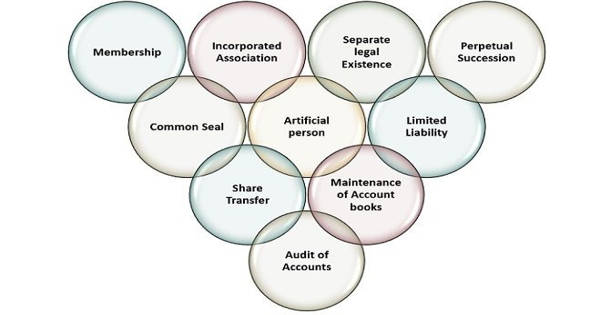A voluntary association of people with common business objectives such as common capital, sharing of profit or loss, common seal, etc. is known as a company. A company is a voluntary association of persons, recognized by law, having a distinctive name, a common seal, formed to carry on business for profit, with capital divisible into transferable shares, limited liability, a corporate body, and perpetual succession.
The literary meaning of the word ‘company’ is an association of persons formed for a common object. It is operated and managed by a ‘board of directors which are elected by shareholders. A separate legal entity, limited liability, common seal, share transferability, etc. are some key features of a company.
Following are the main characteristics of a company
(1) Legal Entity
A company is an artificial person created by law. A company is an artificial person and has a legal entity quite distinct from its members. So, it has a separate legal entity from its members. Being a separate legal entity, it bears its own name and acts under a corporate name; it has a seal of its own; its assets are separate and distinct from those of its members. It can hold and deal with any type of property of which it is an owner in any way like, can enter into contracts, open bank account in its own name, sue and be sued in its name and capacity.
(2) Perpetual Succession
A company enjoys a continuous existence. A joint-stock company is a corporate body. Retirement, death, insolvency, and insanity of its members do not affect the continuity of the company. It acquires a separate legal personality different from its member with a common seal. The shares of the company may change millions of hands, but the life of the company remains unaffected. It does not depend upon the existence of its members. It means the company is not at all affected by the death, lunacy, or bankruptcy of its members or shareholders. In an accident, all the members of a company died but the company continued its operations. The shareholders may come or go but the company goes on forever. Only law can terminate its existence.
(3) Limited Liability
The liabilities of shareholders of the company are limited up to their capital investment only. The liability of the members of a company is invariably limited to the extent of the face value of shares held by them. The liability of the shareholders in the public limited company is limited to the extent of the amount of share, they have subscribed to. This means that if the assets of a company fall short of its liabilities, the members cannot be asked to contribute anything more than the unpaid amount on the shares held by them. The shareholders are not liable for the payment of the excess claim of the creditors even if the capital of the company becomes insufficient.
(4) Common Seal
A company being an artificial person cannot sign for itself. The common seal is another notable characteristic of a company. A seal with the name of the company embossed on it acts as a substitute for the company’s signatures. However, a company being an artificial person, can not sign documents like a natural person. The company gives its assent to any contract or document by the common seal. Therefore, a common seal is used as a substitute for a signature. A document that does not bear the common seal of the company is not binding on it. The common seal is affixed on all documents of the company.
(5) Transferability of Share Capital
The capital of the company is contributed by its members. It is divided into shares of a predetermined value. The shares of a company are freely transferable from one person to another person except in the case of private companies. The private companies, however, do impose some restrictions on the transfer of shares by their members.
















